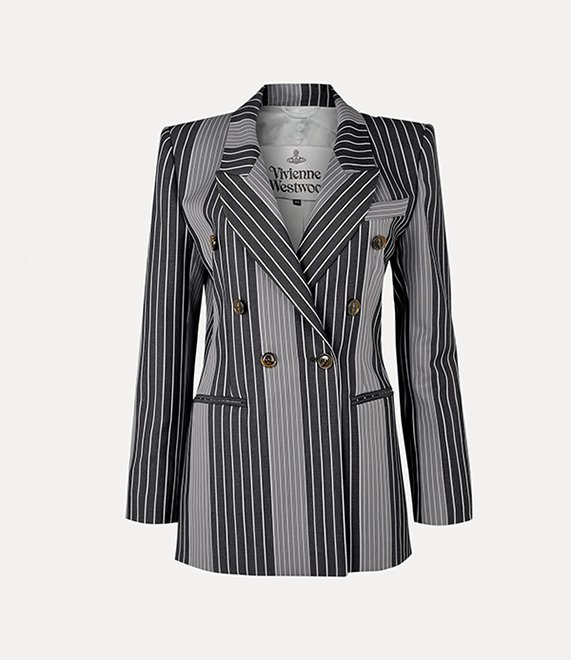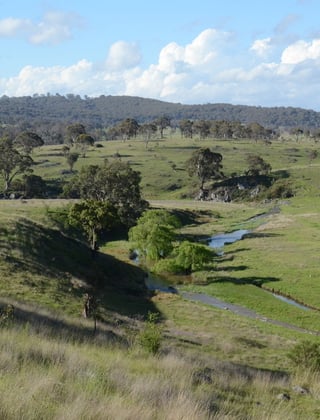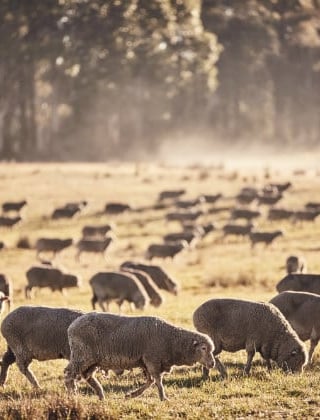Vivienne Westwood’s NATIVA™ certified Merino wool tailoring

For its Spring-Summer 2022 collection, the Vivienne Westwood brand created classic 100% Merino wool unisex tailoring pieces that are fully traceable through the supply chain back to the specific farms in Western Australia that produced the wool.
A Vivienne Westwood 100% Merino wool jacket made using NATIVA™ wool from a farm in Western Australia that practices regenerative agriculture.
For its Spring-Summer 2022 collection, the Vivienne Westwood brand created classic 100% Merino wool unisex tailoring pieces that are fully traceable through the supply chain back to the specific farms in Western Australia that produced the wool.
The avant-garde boutiques of Vivienne Westwood in London, Milan, New York and LA might seem a world away from the sheep paddocks of ‘Hill Padua’ in the North Midlands of Western Australia, but that is where wool from some of their sheep has ended up – in a selection of the brand’s 100% wool jackets, skirts and trousers.
World-renowned British fashion designer Vivienne Westwood and her namesake brand have always been avid supporters of wool in fashion and continue to raise awareness of the environmental impact of fast fashion, urging people to buy better quality clothes, while creating collections that meet this standard. For these special pieces, the brand was keen on sourcing wool from a farm that practices regenerative agriculture.
AWI’s subsidiary The Woolmark Company has an ongoing working relationship with Vivienne Westwood and put the brand in contact with the NATIVA™ traceability program operated by Chargeurs Luxury Materials and worked with the brand’s sourcing and product teams. Through its traceability program, NATIVA™ details and certifies every step of the supply chain, from farm to the end garment, while also certifying the environmental sustainability, animal welfare and corporate social responsibility of the farms from which the wool is sourced.
The result is that the Vivienne Westwood brand can showcase to its customers precisely where in the world the fibre in the classic tailoring for Spring-Summer 2022 was sourced. In this case, the brand was able to highlight to consumers that all of the wool is sourced from NATIVA™ certified farms, with 90% sourced from an Australian farm that undertakes regenerative agriculture. Regenerative agriculture is a holistic farming approach that focuses on enhancing the ecosystem, and strengthening the health, vitality and fertility of farm soil.
Furthermore, the swing tag label on the garments features a unique QR code that consumers can scan with their mobile phones to view the NATIVA™ blockchain website that details the journey of the wool to the final garment.
For the Vivienne Westwood Merino wool tailoring in the Spring-Summer 2022 collection, customers can learn about the NATIVA™ certified properties that grew the wool (including regenerative farm 'Hill Padua'), the specific combing mill in China that produced the wool top, the mill in Italy that spun the wool yarn, the fabric manufacturer in Italy (in this case, Tessilbiella at Biella that produced the Woolmark-certified fabric) and that the garment maker is located in Italy.
The source of the wool: Hill Padua Polls

Merino sheep at Hill Padua Polls, the property that supplied the wool that was used in the Vivienne Westwood Spring-Summer 2022 collection.
‘Hill Padua’ is located at Three Springs in the Wheatbelt of WA, 330km north of Perth. About 8,000ha of the property is currently farmed, with 4,000 ha cropped. It runs approximately 3,000 Merino ewes, each cutting 6kg of wool, and has a consistent lambing percentage of more than 120% per year.
Hill Padua Polls is a Multi Purpose Merino stud. Stud principal Anthony Thomas aspires to breed a large plain bodied Merino that has the meat characteristics of a cross breed, while growing high quality, high yielding, stylish wool.
It is this stylish wool, which is certified through the NATIVA™ traceability program, that is now gracing the boutiques of Vivienne Westwood on the other side of the world – and the staff at Hill Padua are delighted to hear the news.
“It is exciting and great for us to know that high-end designers like Vivienne Westwood are using our wool. In the past, we have had designer Stella McCartney also select our wool through NATIVA™. It is very rewarding for us to know that our wool has been used at the highest level of fashion,” said Hill Padua stud manager Fred Echaniz.
“It is very rewarding for us to hear that our wool has been used at the highest level of fashion.”
- Fred Echaniz, Hill Padua stud manager
Fred says that being certified through NATIVA™ has led to better prices for Hill Padua’s wool.
“We are doing the best we can to create a top product, but at the end of the day it is up to the clients to select the wool they prefer,” Fred commented.
“Hill Padua Polls has been using ASBVs to breed animals with high quality wool. The wool is very white, with very good length and very high strength. We have been selling our wool clips for 10 to 20% more than market price.”
“We believe that traceability is very important. When you do things different you should have a product with more value, and the only way to reach that extra value is with strict traceability.”
- Fred Echaniz, Hill Padua stud manager
Fred says Hills Padua has been implementing regenerative agriculture on the property for many years.
“In the ‘pasture paddocks’, where the animals live, we do not use any chemicals or synthetic fertilisers. We are introducing different plant species to compete for nutrients with the weeds we don’t want,” he said.
“We are using organic ways to fertilise our soil, like compost and we are also using NutriSoil (a biological stimulant produced from worms) to feed microbes that are continuously working to build a healthy soil.
“We have also invested in more than 30km of fencing to protect bushlands and natural habitat reserves on the property.”
Fred says looking after the welfare of the property’s sheep is as important as looking after the land on which they graze. Hill Padua ceased mulesing 18 years ago in 2004.
“At Hill Padua Polls, we do not consider our animals as just numbers; every single animal on this farm is important. We need them as much as they need us,” he said.
“We work with our animals in a peaceful environment, where we interact with them frequently. The rewarding part of this is knowing that our animals are at full production potential just because we provide a very quiet and natural environment for them. We believe that our animals are lucky to have Hill Padua as home.
“We have built recovery paddocks and shelters, where animals if are struggling are brought to, and we spend the necessary time to help them get back on track. It is our responsibility to look after our animals.
“At lambing we look over every mob every day, to assist our ewes and newborn lambs. We look for mismothered and weak lambs, then rescue and raise them ourselves as orphan pet lambs. We have two permanent people for these jobs, during and post lambing, knowing that while economically it may not be ideal, we understand and are choosing the ethical way of looking after our animals.”
Reformation’s traceable wool jumpers

Other brands that have worked with NATIVA™ to source wool from farms that practice regenerative agriculture include US womenswear brand Reformation, which has produced a range of ‘Regenerative Wool Sweaters’ (pictured here on the brand’s online store). Some of the wool is sourced from Ian and Di Haggerty’s ‘Prospect’ property in the central Wheatbelt of Western Australia.
Using traceability to showcase Australian wool
With consumers increasingly interested in the eco-credentials and source of their clothing, clothing brands are increasingly showcasing the on-farm origin of the wool they use and the traceability of their clothing through the supply chain. There are several on-farm QA programs and traceability initiatives available from commercial providers in which woolgrowers can participate.
Recently, AWI and digital transparency company Everledger successfully completed a proof of concept that uses blockchain technology to track and validate the exchange of ownership of selected wools as they move along the supply chain from farm through overseas processing and manufacturing to finished products.
This article appeared in the September 2022 edition of AWI’s Beyond the Bale magazine. Reproduction of the article is encouraged.















